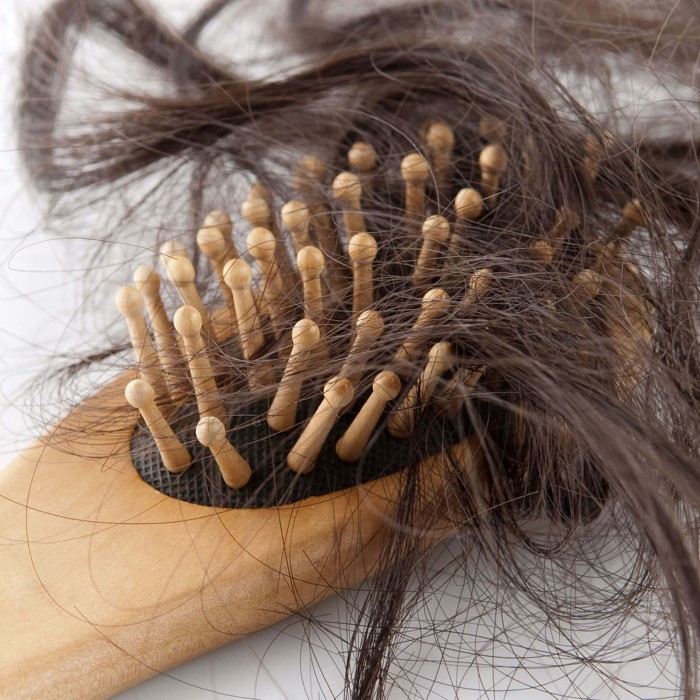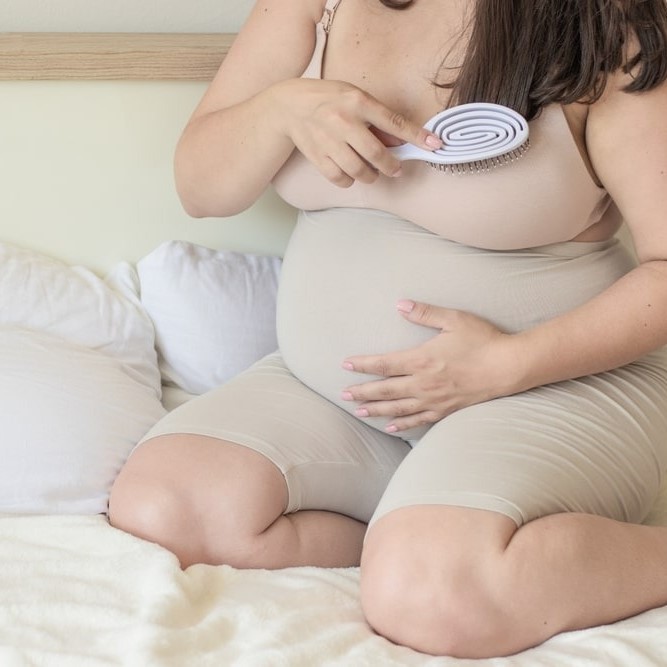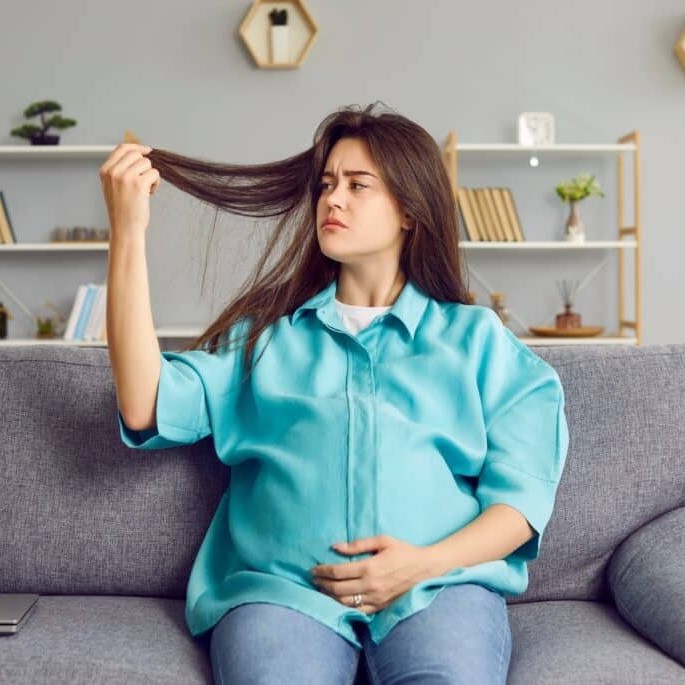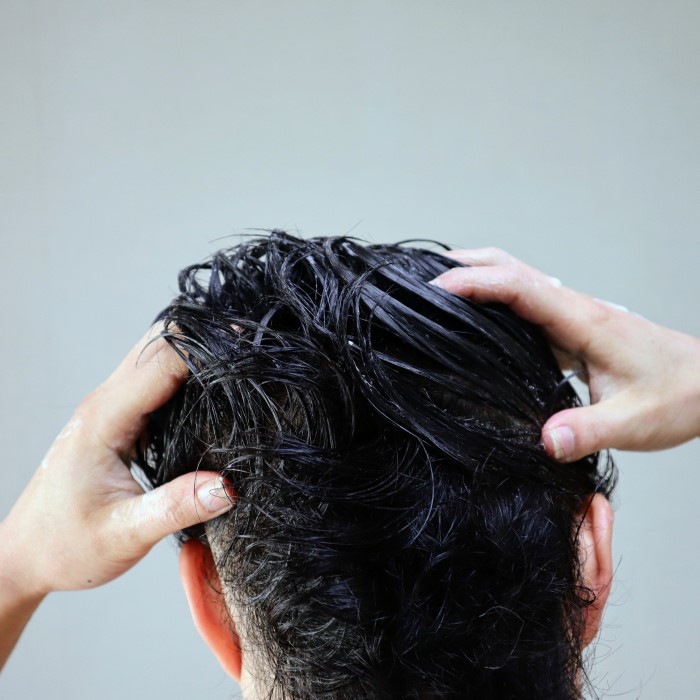
Can Pregnancy Cause Hair Loss? Signs You Shouldn’t Ignore
Introduction: The Connection Between Pregnancy and Hair Loss
Pregnancy is a transformative experience that affects many aspects of a woman’s body, including her hair. Therefore, many expectant mothers ask: can pregnancy cause hair loss? Understanding the changes that occur during this significant time can help address concerns about hair health. Hormonal fluctuations, stress, and nutritional needs can all play a role in changes to hair growth and shedding. This article provides essential insights into pregnancy-related hair loss, focusing on signs to watch for and ways to maintain healthy hair.
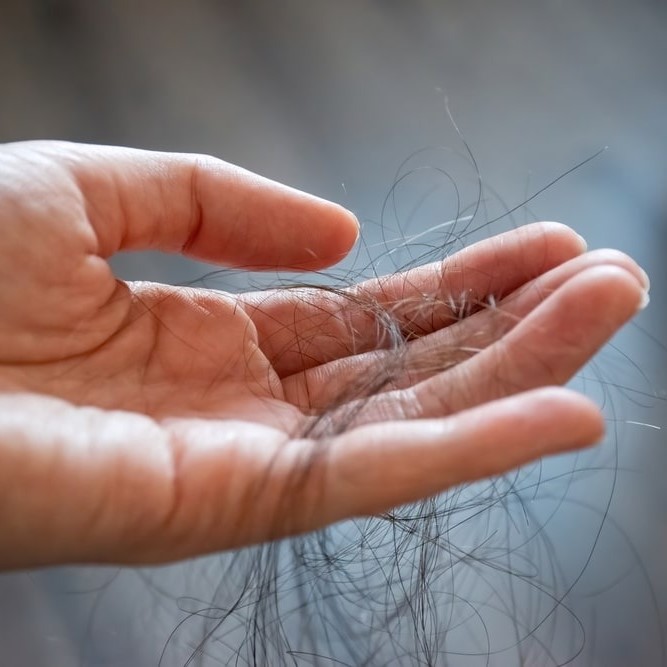
Understanding Hair Growth During Pregnancy
To better comprehend the question, “can pregnancy cause hair loss,” it’s vital first to understand hair growth cycles. Hair typically goes through three stages: anagen (growth), catagen (transitional), and telogen (resting).
- Anagen Phase: This is the active growth stage where hair follicles produce hair. During pregnancy, many women experience an extended anagen phase, leading to thicker and healthier-looking hair.
- Telogen Phase: This is the resting phase, where hair follicles prepare to shed. Typically, around 10-15% of hair is in the telogen phase at any given time. After delivering, many women experience a significant number of hair follicles entering this phase simultaneously, causing noticeable shedding.
- Postpartum Hair Loss: Following childbirth, the hormonal balance shifts back to pre-pregnancy levels. This change can lead to accelerated hair shedding, often referred to as postpartum hair loss. This phenomenon can be alarming, but it is usually temporary.
Understanding these stages provides insights into how normal hair growth can be altered during pregnancy and afterward, answering the overarching question of whether pregnancy can indeed cause hair loss.
Hormonal Changes and Hair Loss
During pregnancy, the body experiences significant hormonal changes, particularly with increased levels of estrogen and progesterone. These hormones impact hair growth effectiveness and hair thickness.
- Estrogen’s Role: Higher estrogen levels prolong the anagen phase, leading to lusher hair. However, once the baby is born, and hormone levels drop, many women experience a sudden shift in the amount of hair shedding.
- Progesterone Influence: Progesterone also plays a role in hair health and can affect the hair follicle’s sensitivity to dihydrotestosterone (DHT), a derivative of testosterone that is associated with hair loss. Fluctuations in these hormone levels can lead to changes in hair density.
- Thyroid Function: The thyroid gland can also influence hair growth. Thyroid hormones may fluctuate during pregnancy, possibly leading to thinning hair. Women with pre-existing thyroid conditions may find that their symptoms worsen during this time.
Recognizing the impact of these hormones allows women to understand the fluctuations in their hair health during pregnancy. While some may enjoy thicker hair, others may begin to notice signs of thinning.
Signs of Hair Loss During Pregnancy
It’s important to be aware of the signs of hair loss that could indicate a more serious problem. While some level of shedding can be normal, certain symptoms warrant attention.
Increased Hair Shedding
- Observation of Shedding: If you observe that significantly more hair is falling out during your daily routines, such as brushing or washing your hair, it may be a warning sign of an underlying issue. Regular hair shedding is normal, but identifying an increase is crucial.
- Typical Shedding Levels: On average, it is considered normal to lose approximately 100 strands of hair each day. This amount varies from person to person, depending on individual hair health and growth cycles.
- Exceeding Normal Limits: If you find that you are losing hair beyond this typical range, it may indicate an underlying problem. This increase in shedding could point to various factors such as hormonal changes, nutritional deficiencies, or even stress-related issues that need to be addressed.
- Potential Causes: Increased hair shedding can stem from several causes, including postpartum hormonal fluctuations, certain medical conditions (like thyroid disorders), or physical and emotional stressors. Being mindful of these signs can help in early intervention.
Patchy Thinning
- Appearance of Bald Patches: If you start to notice bald patches or areas of thinning on your scalp, this could signal a more serious medical condition, such as alopecia areata. This condition is characterized by sudden hair loss in round patches and can occur independently of pregnancy.
- Relationship with Hormonal Changes: Hormonal fluctuations that accompany pregnancy may amplify the effects of conditions like alopecia areata. The body’s changing hormonal landscape can lead to increased sensitivity in hair follicles, making them more susceptible to shedding.
- Need for Medical Evaluation: Patchy thinning should not be ignored. It’s essential to consult with a healthcare professional or dermatologist to assess the situation thoroughly. They can perform necessary examinations or tests to diagnose any underlying health issues and recommend appropriate treatment options.
- Psychosocial Implications: Additionally, the appearance of thinning or bald patches can impact self-esteem and body image. Seeking support from friends, family, or support groups can help address the emotional side of dealing with hair loss.
Changes in Texture
- Noticing Texture Changes: If your hair begins to feel noticeably different, such as becoming finer, drier, or more brittle, this could indicate an underlying issue that requires attention. Texture changes can be a key indicator of overall hair health and may signal the need for specific interventions.
- Indicators of Nutrient Deficiencies: Changes in texture might point towards nutrient deficiencies, particularly in essential vitamins and minerals that promote healthy hair growth. For example, deficiencies in vitamins A, D, E, along with iron, zinc, and protein can lead to weakened strands.
- Hormonal Imbalances: Hormonal imbalances, which can occur during pregnancy or due to other factors, may also affect hair texture. Elevated levels of certain hormones can lead to hair becoming more fragile and prone to breakage.
- Action Plan for Improvement: If you experience changes in hair texture, consider reevaluating your diet to ensure it includes all the necessary nutrients for healthy hair. Consulting with a healthcare provider or nutritionist can help identify dietary gaps and recommend appropriate supplements or dietary changes.
- Hair Care Routine Adjustments: Alongside addressing underlying issues, making adjustments to your hair care routine can also help restore texture. Using nourishing hair products designed for dry or brittle hair can enhance overall health and appearance.
Recognizing these signs can empower women to seek solutions early, leading to better outcomes for hair health during pregnancy.
Common Questions About Pregnancy and Hair Loss
Is it normal to lose hair in early pregnancy?
It’s typical for women to experience some hair changes during early pregnancy, but excessive hair loss isn’t common. Instead, many notice their hair becoming thicker due to hormonal changes. If significant shedding occurs, consult a healthcare provider.
Do pregnancies make your hair fall out?
Pregnancy can lead to changes in hair growth patterns; however, significant hair loss typically occurs postpartum as hormonal levels decline. It’s crucial to differentiate between normal growth cycles and excessive shedding that may need attention.
What are the signs of pregnancy in hair?
Signs of changes in hair during pregnancy include thicker locks initially, but this can lead to shedding once postpartum hormone levels normalize. Any sudden changes in texture or shedding should be monitored.
Does everyone lose hair after pregnancy?
Not everyone experiences postpartum hair loss. However, many women do notice a phase of increased shedding within the first six months after delivery. Genetics, hormone levels, and overall health can influence individual experiences.
Nutritional Factors Affecting Hair Health
Diet plays an integral role in maintaining hair health, particularly during pregnancy when nutritional needs increase. Deficiencies in critical vitamins and minerals can contribute to hair loss or thinning.
- Protein: Hair is primarily made of protein. Ensure to incorporate enough protein-rich foods, such as lean meats, legumes, and dairy products. This will support hair structure and promote growth.
- Iron and Zinc: Iron supports oxygen transport in the bloodstream, while zinc contributes to hair tissue and repair. Include foods like spinach and pumpkin seeds in your diet to ensure adequate intake.
- Vitamins A, C, D, and E: These vitamins promote healthy scalp and hair. Consuming fruits, vegetables, and nuts can provide a good balance of these essential nutrients.
- Omega-3 Fatty Acids: These healthy fats nourish the hair and support overall scalp health. Sources include fish, flaxseeds, and walnuts.
Incorporating these nutrients through a balanced diet can significantly impact hair health during and after pregnancy, helping mitigate potential hair loss concerns.
Solutions for Managing Hair Loss
If you are experiencing hair loss during or after pregnancy, several strategies can help manage the situation effectively.
- Consult a Healthcare Professional: Always consult with your doctor or a dermatologist if you notice significant or persistent hair loss. They can provide tailored advice or run tests to determine underlying health issues.
- Gentle Hair Care: Use gentle shampoos and conditioners suited for your hair type. Avoid excessive heat styling and tight hairstyles that can cause additional stress on the hair shaft.
- Supplements: Consider discussing hair and prenatal vitamins with a healthcare provider. A multivitamin that includes essential nutrients for hair health can help address deficiencies as needed.
- Protective Hairstyles: Consider wearing hairstyles that reduce tension on the hair while still looking attractive, like braids or buns.
- Stress Management: High-stress levels can also trigger hair loss. Incorporate relaxation techniques such as yoga or meditation to promote overall well-being and reduce stress.
- Stay Hydrated: Drinking enough water not only supports overall health but can also promote hair vitality. Aim for adequate hydration throughout the day.
Being proactive in managing hair health can greatly alleviate concerns about hair loss during and after pregnancy.
Conclusion
Can pregnancy cause hair loss? In conclusion, the question of whether pregnancy can cause hair loss is multifaceted. While pregnant women often experience thicker hair due to hormonal changes, the postpartum period typically brings an increase in shedding. Recognizing the signs early can help address any concerns effectively. Monitoring nutritional intake and maintaining a healthy lifestyle provides additional support for managing hair health during this transformative time.
If you notice significant changes in your hair during or after pregnancy, it’s essential to seek guidance from healthcare professionals. Early intervention can lead to better outcomes for keeping your hair healthy. Remember, pregnancy is a time of substantial change, and being informed about these shifts empowers you as you navigate this beautiful journey. Stay attuned to your body, embrace the changes, and prioritize your well-being for both you and your baby.
